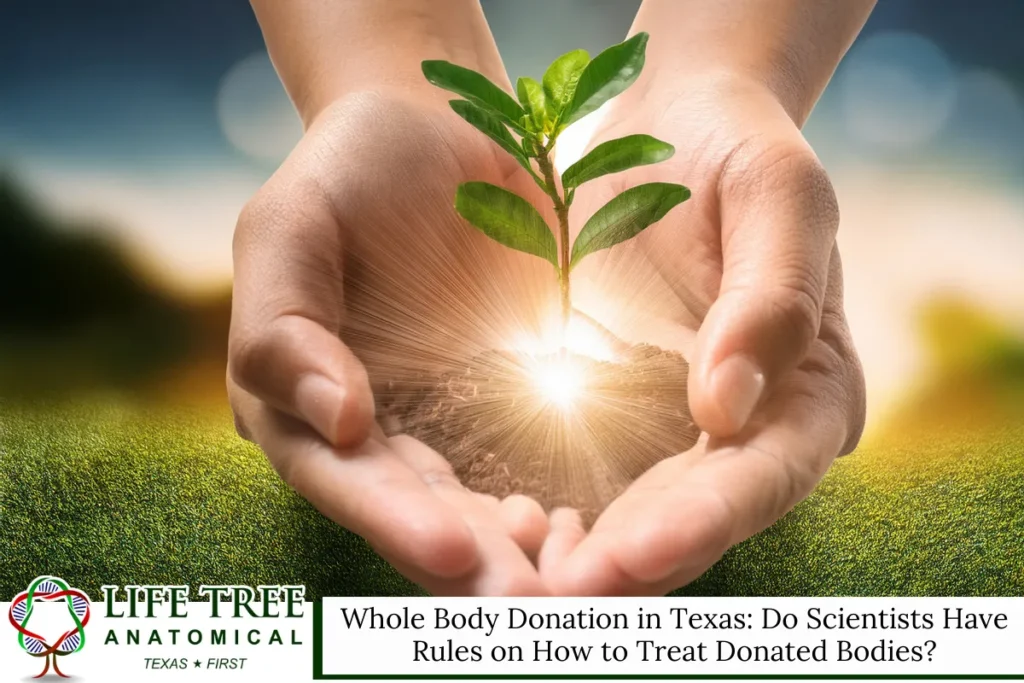Whole body donation provides significant benefits to both families and medical schools in Texas. Through the donation of a loved one’s body, families have the opportunity to contribute to the advancement of medical science. In contrast, medical schools gain essential resources for training future healthcare professionals. This process not only supports educational development but also leads to advancements in medical research that can improve the health and lives of many. Let’s explore in depth how whole body donation serves both medical institutions and the families who make this important decision.
What is Whole Body Donation?
Whole body donation refers to the act of donating an individual’s body after death to be used for medical education, research, and training. Unlike organ donation, which typically focuses on saving or improving the lives of individuals through the transplantation of organs, whole body donation serves as a tool for the broader education of healthcare professionals. These donations are crucial for medical schools to train future doctors, nurses, surgeons, and other healthcare professionals in their understanding of human anatomy, disease, and surgical procedures.
In Texas, the process is well-regulated, and multiple medical institutions rely heavily on these donations to maintain high-quality education and research programs. The generous act of donating one’s body leaves a lasting legacy, aiding in both current and future healthcare advancements. Many donation programs in Texas, such as Life Tree Anatomical, ensure that the process is conducted with respect and compassion for the families involved.
How Whole Body Donation Supports Medical Schools in Texas
Training Future Healthcare Professionals
Whole body donation plays a vital role in the education of future healthcare professionals in Texas. Medical schools in the state, including prestigious institutions such as the University of Texas and Baylor College of Medicine, rely on these donations for their anatomical education programs. By working with real human bodies, students can gain hands-on experience that is irreplaceable by textbooks or computer simulations. Dissecting a donated body gives students a profound understanding of human anatomy that will be fundamental as they advance in their medical careers.
This type of direct learning helps prepare students for the realities of their future roles. It bridges the gap between theoretical knowledge and practical, clinical skills, allowing future healthcare professionals to become more competent, confident, and empathetic in their work.
Advancing Medical Research in Texas
Whole body donation is equally essential for advancing medical research. By studying human bodies, researchers can gain a deeper understanding of disease progression, test surgical techniques, and develop new treatments or medical technologies. Texas is home to many research institutions that depend on body donations to drive discoveries that can potentially revolutionize healthcare.
For example, researchers may use donated bodies to study cancerous tissues, neurological diseases, and aging processes. These studies could lead to breakthroughs that save lives and improve the quality of life for individuals battling illnesses. Medical researchers in Texas rely heavily on the availability of donated bodies to ensure the accuracy and efficacy of their work.
Enhancing the Quality of Medical Education
Medical education in Texas is highly regarded, thanks in part to the use of whole body donations. The quality of education that students receive when they have access to real human bodies is unmatched. They can practice complex surgical techniques, understand the impact of diseases, and familiarize themselves with human organs and systems in a way that isn’t possible with synthetic models. This exposure enables them to handle real-life medical situations better, ensuring they are well-prepared for their professional roles.
Through body donation programs, students receive the most comprehensive education, which ultimately benefits patients and communities across Texas. Better-trained healthcare professionals translate to a higher standard of care for individuals in the state.
The Benefits of Whole Body Donation for Families in Texas
Leaving a Lasting Legacy
For many families in Texas, whole body donation is a way to leave behind a meaningful legacy. The decision to donate the body of a loved one after death can provide immense comfort, knowing that the donation will help educate future healthcare professionals and advance medical research. This selfless act directly contributes to the future of medicine, saving lives and enhancing healthcare for generations to come.
Families who choose whole body donation can take solace in the fact that their loved one’s death will contribute to something greater—education and scientific progress. The knowledge that their relative is helping to shape the future of healthcare can be an incredibly positive and comforting thought during a difficult time.
Emotional and Psychological Benefits
While the decision to donate a body can be difficult and emotional for many families, the benefits often outweigh the challenges. Knowing that a loved one’s body will be used to help educate students, advance research, and ultimately improve lives brings a sense of purpose and honor to the grieving process. Many families experience a sense of peace, knowing that their relative’s contribution will help others in profound ways.
The psychological comfort that comes from knowing that a loved one’s body is making a significant impact on the medical field can ease the grieving process and provide a sense of closure. Additionally, families may feel a greater sense of connection to the broader community, as their loved one’s body is actively contributing to societal progress.
Financial Considerations
For some families, whole-body donation can help reduce the financial burden associated with funeral costs. Many donation programs in Texas offer transportation and body preparation services at no cost or at a reduced rate. This can significantly reduce the expenses families face after the death of a loved one. Moreover, some families appreciate the opportunity to avoid the emotional stress of organizing a funeral, as the body donation process is typically straightforward and well-managed by the program.
The Process of Whole Body Donation in Texas
Whole-body donation in Texas is a relatively straightforward process, but it requires prior planning and an understanding of the legal steps involved. Families must contact a body donation program before the death of the individual to ensure that the donation can be arranged properly. Once the individual has passed, the body is transported to the program, where it will be prepared for use in medical education or research.
Each program, such as Life Tree Anatomical, provides a clear set of guidelines to ensure a respectful and smooth donation process. Families receive dedicated support throughout the process, and the program ensures that all necessary documentation is completed correctly.
Ethical Considerations and Legal Aspects of Whole Body Donation in Texas
Consent and Legal Documentation
The ethical and legal aspects of whole body donation are vital in ensuring that the process is conducted respectfully. In Texas, it is crucial to obtain proper consent before death, either from the individual who wishes to donate their body or from their family members after death. Certain specific legal forms and documents must be completed to formalize the donation process.
By understanding the legal requirements and making the necessary arrangements ahead of time, families can ensure that their loved one’s wishes are honored and that their body will be used in a meaningful way.
Ethical Guidelines
All body donation programs in Texas, including Life Tree Anatomical, follow strict ethical guidelines to ensure that each donation is handled with respect and care. Donor families are treated with compassion, and the donation process is fully transparent, ensuring that there is no ambiguity regarding the use of the body. Ethical considerations also involve ensuring that the body is used exclusively for medical research and education, and not for any other purposes.
The Value of Whole Body Donation in Texas
Whole body donation provides far-reaching benefits to both medical schools and families in Texas. It enhances the education and training of future healthcare professionals, advances critical medical research, and provides families with an opportunity to make a lasting impact on society. By choosing to donate a loved one’s body, families in Texas help pave the way for future breakthroughs in healthcare that can save lives and improve the well-being of countless individuals.
The decision to donate a body is deeply personal and should be made with careful consideration. However, for many, the opportunity to contribute to medical science provides comfort, knowing that their loved one’s legacy will live on in the hands of future doctors, researchers, and healthcare workers. Whole body donation is a gift that keeps giving, benefiting future generations and ensuring that medical progress continues to move forward.
Texas Whole Body Donation – Life Tree Anatomical
Life Tree Anatomical in Austin, Texas, offers a compassionate and respectful whole body donation program. As the first non-university willed body program in the state, we are dedicated to helping families make a meaningful contribution to medical education and research. The process is straightforward, and the team ensures that families receive the support they need throughout the donation journey.
Choosing us means making a lasting contribution to healthcare in Texas. By partnering with medical institutions and researchers, we help shape the future of medicine while offering a respectful and dignified process for donors and their families. For more information or to discuss donation options, contact us at (512) 402-8533. Our team is ready to answer any questions and provide assistance every step of the way.
FAQ: Whole Body Donation for Families and Medical Schools in Texas
What is whole body donation, and why is it important for medical schools in Texas?
Whole body donation involves donating a deceased person’s body for medical education and research. This selfless act provides essential resources for medical students and medical professionals to enhance their medical training. By studying anatomical structures, gross anatomy, and performing surgical procedural training, future doctors and healthcare workers develop the hands-on experience they need to provide quality patient care. In Texas, whole-body donation is crucial for preparing students to understand the complexities of medical conditions and for advancing medical breakthroughs. The body is used in surgical training, where students practice dissection, gain practical insights into medical devices, and apply their knowledge in real-life scenarios. Moreover, biomedical scientists and research projects benefit from these donations, helping them explore new medical advancements. It facilitates a deeper understanding and enables further discovery in the medical field.
What is the process of donating a body in Texas?
The process of whole body donation in Texas requires careful planning. To donate a body, individuals must register in advance with a body donation program or an anatomical donors network. After the time of death, a death certificate must be obtained, and consent forms must be signed by the family members or the individual who has pre-registered. The medical screening process ensures that the body is suitable for medical training or research projects, especially when studying anatomical structures. Once approved, the body is transported to the program facility. The family handles Memorial services or cremated remains, and many programs offer the option to return the cremains after the body is used. The entire process is transparent and conducted with respect, ensuring that families feel supported throughout the journey.
What are the benefits of donating a body to medical schools in Texas?
Donating a body for medical education in Texas brings numerous benefits to both the medical community and the family. For medical schools, it plays a vital role in medical training, especially in providing students with hands-on experience in gross anatomy and surgical skills. By working with real human bodies, students gain a deeper understanding of human physiology, which enhances their surgical training and prepares them to deal with complex medical conditions in their future careers. Moreover, body donors directly contribute to the development of medical breakthroughs, as these donations are often used in research projects to discover new treatments and technologies. For families, donating a body can be a meaningful way to leave a legacy. It also offers emotional peace, knowing their loved one’s body is helping to advance healthcare and improve patient care for generations to come.
Can a body donor’s family hold a memorial service after donation?
Yes, families of body donors in Texas can still hold a memorial service after the donation has taken place. In fact, many families choose to do so. Typically, a memorial service is held before the body is transported to the donation program, allowing family members and friends to honor their loved one. Since whole body donation focuses on education and research, the family can decide how they wish to commemorate their loved one’s life. After the body is used for medical training or research projects, the family may also receive cremated remains, depending on the terms of the donation agreement. This provides a tangible way to remember the individual while making a meaningful contribution to the medical field. Some donation programs also allow for specific arrangements to ensure families receive proper closure and support during the process.
Are there any ethical concerns associated with whole-body donation?
Whole body donation programs in Texas adhere to strict ethical guidelines to ensure that donations are handled with respect and dignity. Consent forms are required, and the donation must be voluntary, with full understanding of how the body will be used. The program’s transparency allows families to make informed decisions and ensures that the body donors’ remains are used solely for medical training, surgical training, and research projects. Ethical considerations also include the treatment of the body, ensuring that it is used only for the purpose of advancing medical breakthroughs and not for personal gain. Furthermore, medical professionals and institutions involved in the donation process are committed to supporting families, including arranging for memorial services and handling cremated remains. Ethical practices also extend to the handling of anatomical structures, ensuring that they are treated with respect throughout the donation process.
How does whole body donation contribute to medical breakthroughs and advancements?
Whole body donation plays a crucial role in advancing medical breakthroughs and enhancing the development of new treatments. By donating their bodies, individuals contribute to the study of anatomical structures, helping researchers, biomedical scientists, and medical professionals gain a deeper understanding of the human body. These donations are utilized in research projects to test new medical devices, enhance surgical training, and develop therapies for various medical conditions. Moreover, through the study of the body, medical schools can simulate real-life situations for medical students, which is invaluable for training medical professionals. The practical application of this knowledge can lead to groundbreaking discoveries and better patient care. Therefore, whole body donation is not just a gift to the medical community—it directly contributes to the ongoing quest for improving healthcare worldwide.
Read more: Whole Body Donation Programs in Texas: Options Beyond Funeral Homes




